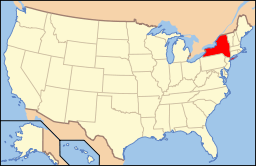West Bank Light
|
West Bank Lighthouse | |
 | |
| Location |
west of Ambrose Channel lower New York Bay |
|---|---|
| Coordinates | 40°32′16.8″N 74°02′34.1″W / 40.538000°N 74.042806°WCoordinates: 40°32′16.8″N 74°02′34.1″W / 40.538000°N 74.042806°W |
| Year first constructed | 1901 |
| Year first lit | 1901 |
| Automated | 1985 |
| Foundation | Concrete/cast-iron caisson |
| Construction | Cast iron |
| Tower shape | Frustum of a cone sparkplug |
| Markings / pattern | Brown on black base |
| Height | 55 feet (17 m) |
| Focal height | 69 feet (21 m) |
| Original lens | Fourth-order Fresnel lens |
| Current lens | 12 inches (300 mm) |
| Characteristic |
Isophase 6s white from 181° to 004° red from 004° to 181°. |
| Fog signal | Horn: 2 blasts every 20 s |
| Admiralty number | J1081 |
| ARLHS number | USA-876 |
| USCG number | |
|
West Bank Light Station | |
| Nearest city | New Dorp Beach, Staten Island, New York City |
| Area | 0.1 acres (0.040 ha) |
| Architect | U.S. Lighthouse Board |
| MPS | Light Stations of the United States MPS |
| NRHP Reference # | 06001230[4] |
| Added to NRHP | January 9, 2007 |
West Bank Light, officially West Bank Front Range Light,[1] is in Lower New York Bay and acts as the front range light for the Ambrose Channel. It is currently active and not open to the public.
The tower was built in 1901 and heightened in 1908. Staten Island Light serves as the rear range.
On May 29, 2007, the Secretary of the Interior identified West Bank Light, offshore in Ambrose Channel–Lower New York Bay, as surplus under the National Historic Lighthouse Preservation Act of 2000. The property was described as:
55 ft. tower (1901) off the southerly end of West Bank, NY on 0.10 acre submerged land, cast iron conical “spark plug” style light sits on a concrete/cast iron caisson. Two floors, five stories high keeper’s dwelling, approx. 1500 SF. Markings: brown on black base. Riprap breakwater extends westward approx. 40 feet to provide mooring space, landing platform. Can be seen from South Beach, Staten Island and from Coney Island boardwalk; accessible by boat only. Listed on the National Register of Historic Places and must be maintained according to the Secretary of Interior’s Standards for Rehabilitation. Historic covenants will be incorporated into the Quitclaim Deed; however, no submerged land will be conveyed under the Quitclaim Deed. U.S. Coast Guard shall retain an easement for an Arc of Visibility and an unrestricted right of access in, to and across the property to maintain, operate, service, repair and install equipment as necessary to support its aid to navigation mission. Additionally, the USCG shall retain the unrestricted right to relocate or add any aids to navigation, or communications towers and equipment (along with necessary right of ingress/egress), or make any changes on any portion of the property as may be necessary for navigation/public safety purposes.[5]
No group was identified under the National Historic Lighthouse Preservation Act as willing and able to preserve the West Bank Light, and on June 5, 2008, the General Services Administration placed the light up for sale via an auction. The initial bid was $10,000 and the auction ended on August 27, 2008 at a final bid of $245,000.[6] That was not the end of the story, as the sale did not close. The light was auctioned a second time in September 2010 and finally sold for $195,000 to Sheridan Reilly.[3]
References
- 1 2 Light List, Volume I, Atlantic Coast, St. Croix River, Maine to Shrewsbury River, New Jersey (PDF). Light List. United States Coast Guard. 2012. p. 298.
- ↑ "Historic Light Station Information and Photography: New York". United States Coast Guard Historian's Office.
- 1 2 Rowlett, Russ. "Lighthouses of the United States: Downstate New York". The Lighthouse Directory. University of North Carolina at Chapel Hill.
- ↑ National Park Service (2009-03-13). "National Register Information System". National Register of Historic Places. National Park Service.
- ↑ Available properties through the National Historic Lighthouse Preservation Program for 2007
- ↑ GSA listing (1-PR-08-004) for West Bank Light
External links
- Lighthouse Friends site
- National Park Service Historic Lighthouses
- NPS West Bank at the Wayback Machine (archived November 4, 2013)


